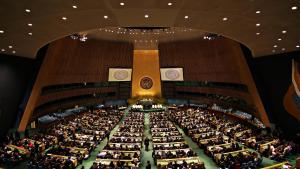KAS: Dear Mr. Gröhe, on September 20, a high-level meeting of heads of state and government took place at the United Nations General Assembly in New York on pandemic prevention, preparedness and response. Afterwards, the World Health Organization spoke of a "historic milestone." What is it all about?
First of all, this was the first time such a meeting was held at the level of heads of state and government. Among other things, the joint declaration adopted holds out the prospect of measures against misinformation. It also commits to strengthening primary health care and ensuring that robust national health systems are in place to respond to future pandemics. The goal is to enable all countries to act throughout the course of a pandemic. But certainly the most important point of the declaration is the clear political signal of support for the pandemic treaty negotiations underway in Geneva during the last few months.
KAS: Why does the international community need such a pandemic treaty?
Governments, academia, business and civil society quickly realised during the pandemic that the international community was not well prepared for this crisis. Some examples: There were no clear criteria for declaring a pandemic, and the World Health Organization (WHO) had neither the financial nor the political resources to respond to the crisis. For example, it did not have access to the initial Covid-19 outbreak areas in China. Country responses to the pandemic were often not well coordinated. Insufficient solidarity in the distribution of diagnostics and vaccines cost many lives. It is true that the International Health Regulations exist to prevent and control the cross-border spread of disease. But the existing rules were either inadequate or not implemented. That's why WHO member states decided, on the one hand, to revise the International Health Regulations at the end of 2021 - and, on the other, to negotiate a pandemic treaty for the first time.
KAS: Why do we need another instrument at all; aren't the International Health Regulations sufficient?
The revision of the International Health Regulations is important - also because it can be implemented more quickly. But many states only want individual adjustments to the content. That alone is not enough because the International Health Regulations also do not cover all the areas that are important for a pandemic, especially when it comes to issues of equity. Therefore, in March 2021, a broad alliance of countries from all continents, including Germany, spoke out in favour of the swift development of a pandemic treaty.
KAS: What would be the content of such a treaty? What is already crystallizing in the negotiations in Geneva?
The pandemic treaty should be seen as an opportunity to decisively address the weaknesses in pandemic response for the benefit of all. Many areas are currently being discussed in the negotiations, including the conditions for declaring a "pandemic situation," incentives for member states to better share information on pathogens, faster WHO access to outbreak areas, cooperation in research and development, and measures for a more equitable distribution of medicines and vaccines. At the same time, the goal is to strengthen the WHO's ability to act in a pandemic. A pandemic treaty would certainly - and rightly – strengthen the WHO’s role.
KAS: There is criticism - also from voices in Germany - of strengthening the role of the WHO and of the pandemic treaty itself. These voices fear, for example, the erosion of national competences and see an attempt to transform the WHO into a kind of global health police that could restrict citizens' fundamental rights.
This kind of propaganda against a pandemic treaty is inappropriate and wrong. It also completely misses the point of the negotiations. The powers of the WHO are to be strengthened. But the pivotal role of the member states would not change. The rights of citizens would also be preserved, of course. Right at the beginning, the draft negotiation calls for respect of fundamental freedoms and human rights. In addition, the treaty is to be implemented explicitly in respect to the national health policies of the member states. It would be important that such a treaty or accord should be – at least partly - binding. After all, many states - especially authoritarian ones - have little interest in granting the WHO the necessary access at an early stage in the event of outbreaks.
However, this does not mean that all the proposals that are being discussed are necessarily good ideas. One controversial proposal, which I view critically, would be to weaken or waive patent protection for vaccines and medicines. In the absence of the necessary capabilities in many countries, such a step would lead neither to faster production nor to more equitable distribution. It would also send the wrong signal to companies' research efforts.
In principle, however, the draft contains many important elements.
KAS: How can this pandemic treaty process be brought to a successful conclusion? How should Germany position itself?
Under the leadership of Angela Merkel, Germany has taken a leading role in the world in the area of global health. Germany's voice carries weight in Geneva. This should be used to advocate for an ambitious pandemic treaty. Three points would be important here:
First, it must be a balanced accord that addresses all phases of a pandemic. It should also include measures for faster information exchange and quicker access to outbreak areas. But more binding measures that ensure a more equitable distribution of diagnostics, therapeutics and vaccines must also be part of the package.
Second, the pandemic treaty should contain as many binding regulations as possible. The declared goal of reaching an agreement by May of next year is certainly very ambitious. It remains to be seen whether this will be achieved. But one should not waste too much time either. After all, it is well known that windows of opportunity for reform after crises are very short.
Thirdly, it is important that the treaty is not only discussed between negotiators in Geneva. Rather, a broad public debate about the goals and emerging contents of the pandemic treaty must begin now - involving the scientific and business communities, civil society and parliaments - to better prevent misinformation and conspiracy theories. The Konrad Adenauer Foundation will participate in such a discussion. Certainly, a pandemic treaty cannot solve all problems. It cannot relieve countries of their own homework to improve pandemic preparedness. But a successful conclusion of the negotiations offers an opportunity to better equip the world for future pandemics. We cannot miss this opportunity!
KAS: Thank you very much for the interview!






